In 2019, at the tender age of 23 years old, I organized a Rapid Chess Tournament in Switzerland. I brought this up in a recent interview on 64: A Chess podcast and David asked me to write an article about it.
So, here I am, this one is for you David!
I hope this inspires some of my readers to (help) organize a chess tournament as well. It is a great experience, not only for the players!
Here is what I will write about:
- First Edition in 2019
- Cancelled Edition in 2020
- Step-by-Step guide:
- Set up a Goal/Vision
- Choose your format, set up a Budget
- Find a Team
- Search for Sponsors
- Secure a playing hall
- Advertise to get more players
- Conclusions & Future Plans
Noël Studer Trophy 2019
So, how do you organize a Chess Tournament? The tournament I organized was called Noël Studer Trophy (more to that hotly discussed tournament name later) and took place in April 2019 in Bern, Switzerland.
It was a 7-round rapid tournament mainly aimed at amateur chess players. 80 players aged 5-85 fought hard for the victory in two categories: Non-Rated (16 players) & Rated (64 players).
Some of the highlights were:
- Computer worth 1500$+ as the main prize. The winner was decided by drawing of lots
- 4000$ prize fund
- A delegation of 10 people coming all the way from Munich
- The friendly atmosphere after the game & fighting spirit during the game
- Nearly 100% attendance rate at the prize giving (world record?)
As the feedback from sponsors, participants & my team was great, we happily started to plan for a second, even better & bigger version of the tournament.

Second Edition
Well, I guess you know what happened in 2020… After postponing the tournament once, I sadly had to cancel it altogether in late 2020. I still think that the second edition would have really been the breakthrough for this tournament.
Here are some stats:
- We filled up a Budget of roughly 20’000$ through different Sponsors & supporters
- The playing hall was a newly renovated huge conference room in a central Hotel in Bern (potential of 200+ players)
- Doubling the participants was our goal. This would have made us (most likely) the biggest 1-day tournament in Switzerland in only the second edition!
It still hurts that this (and maybe future editions) had to be canceled. But let’s focus on the positive. I hope the following paragraphs help you understand better how an OTB Chess tournament is organized.
And who knows, maybe one day the second edition will be taking place. Re-named as NextLevelChess Trophy 😊.
Step-by-Step Guide
The idea of organizing a chess tournament came to my mind in August 2018.
I was continuously criticizing the lack of good rapid & blitz tournaments in Switzerland. As talking about did not bring any changes (neither from private organizers nor from the federation) I decided to take fate into my own hands.
Goal/Vision
My vision was a weekend full of fast-paced chess. A Festival with a Rapid & Blitz celebrating the beauty of chess. I always loved taking part in the Rapid & Blitz World/European Championships and wanted to organize something similar in Switzerland.
The Austrian Federation had already shown that this is possible, why not in Switzerland as well then? Additionally, the European Rapid & Blitz Championship attracts way more Amateurs than professional players. There seems to be a big need for such great tournaments!
My main focus was on making it enjoyable for amateur chess players. Professional chess is nothing without millions of chess fans around the world playing & watching chess. Once many amateur players love an event, you can find sponsors & increase the budget to also make it more interesting for professionals.
Either this tournament could then become the Swiss Championship, or it would stand as an example of a Swiss Rapid & Blitz Championship. With over 6’000 licensed players in Switzerland, (and MANY more online chess players) I was convinced a well-organized tournament could attract at least a couple hundred participants.
It may only be a funny coincidence, but the Swiss Chess Federation organized the first real Rapid & Blitz Championship in 2021. I am happy that at least this part of my vision became a reality very quickly!
This proved to me once more that your acts are the biggest inspiration. Not what you say, but what you actually do!
Choose a Format
The start for me was to decide what exact format I would choose. Even if I dreamed big, starting with a tournament lasting several days seemed too naïve and risky. That is why I quickly settled for a 1-day tournament to start with. Blitz or Rapid? There is no right or wrong. Both time controls can be a great success for a 1-day tournament.
I went with Rapid because the time control is:
- Better suited for the first tournament for Beginners
- Less hectic & easier to plan
And as I wanted to attract players from all over Switzerland, the starting & ending time needed to be reasonable to still drive 2.5 hours home (yes Switzerland is tiny & Bern very central). I find it extremely important that you have a clear image of whom you want to attract before you decide anything.
Most likely it won’t make a huge difference if the tournament is 7 or 9 rounds. But a too early starting time might make it impossible to reach people not living in close surroundings. This obviously varies strongly from place to place.
Think who should participate in your tournament & then make the tournament as attractive as possible for these players!

Set Up A Budget
Setting up a Budget can be very difficult, especially for your first tournament. But without finances, no tournament. And as you’ll read later, having a serious (and ambitious) budget is a key factor in getting sponsors.
Organizing a tournament has two major costs:
- Tournament Venue
- Prizes
In my case, they made up 80% of the costs in the first edition (5400$/6500$ total). While you can adjust the prizes depending on how many players are participating, the tournament venue is a fixed cost, even if only 10 players show up.
There are two things I learned in the process of setting up a Budget:
- You will always underestimate the costs
- Perfection stops you
When you just start out, there are so many things that you aren’t thinking of that will cost something. So, make sure to have some breathing space in case you forgot something.
The fear of missing some expense might make you a data freak. But setting up the budget is only the first small step. So don’t overdo it and start getting into the real world.
Find Your Team
If you are still alone in your vision, this is the right time to reach out to other chess aficionados & find co-hosts or helpers. Organizing a tournament takes a lot of time & energy. Without my co-organizer and many helpers, I could have never organized this tournament.
Optimally, find people that have different strengths than yours. Splitting up tasks can be super helpful. As I am extremely bad tech-wise, I was super happy to find people who could do:
- Homepage
- Pairings & Results
- Flyers
I had nothing to do with anything tech-related. This was a great relief. On the other hand, I had a name and already knew some potential sponsors. So it was only logical that I would take over this part of the tournament.
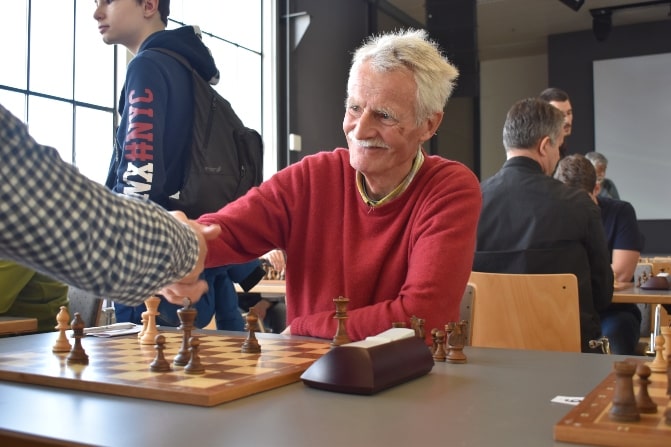
Search For Sponsors
I am not going to lie. Finding suitable sponsors is hard.
Big companies get hundreds of sponsoring requests every day. Standing out among the mass has become more difficult than ever before. However, there are some principles that you can use to increase your chances to get a suitable sponsor for your tournament (or in my case, also for my personal chess career).
In this section, I will focus on the first edition of the tournament. If you do it the right way, the second edition will be MUCH easier, as you already have existing win-win situations.
- Opt for small to medium-sized local companies
- Find potential sponsors that resonate with your participants
- Think from their side: what is a deal they cannot say no to?
Rolex Or Brentford.ch?
Having a huge Brand like Rolex, UBS, or Novartis as a sponsor would be amazing. However, it is equally unlikely. As I wrote before, those brands get hundreds, if not thousands of requests EVERY SINGLE DAY.
Already getting a “No we can’t sponsor your tournament” is a great success. In 90% of the cases, some assistant will shortly scan through your request and click “delete” without even responding. This might sound harsh, but it is the reality. So if your tournament is not a big name yet, search for companies that fly under the radar.
Don’t let your ego get in the way of getting small sponsorships to start with.
What Is An Optimal Sponsor?
If you are in this for the long term, you really want to create a win-win partnership with your sponsors. In order to do that, you need to find sponsors that resonate with your audience/participants.
Landing a deal is great. But if that deal turns out to be unsuccessful for the sponsor, you will start from 0 for the second tournament. That is certainly not ideal. What are your participant’s needs? What are they paying money for anyway?
Any company that has anything to do with chess is a great start. A chess online store in your country/region. A local private chess school. Or some online chess sites which want to advertise their courses.
Again, it is tempting to just reach out to all the big names and hope for a deal that finances the whole tournament. You can try, but the likelihood that you succeed is rather small.
Don’t be afraid to slowly build up a tournament with a good reputation. If you are hoping to be the #1 from the get-go, you should re-think if organizing a tournament is really something for you.
My main sponsor was a computer retailer from Switzerland (they ended up supporting me until the end of my career in 2021 and I’m still in touch with them now).
Why was that a win-win situation?
- Nearly all chess players have computers
- Our target audiences are similar (Switzerland)
- Nobody in the Swiss chess world had heard of that company before (new possible clients)
Other sponsors were:
- Local Jewelry Store (sponsoring a Watch 800$)
- Swiss Chess Store (sponsoring vouchers worth 500$)
- Swiss Tax service
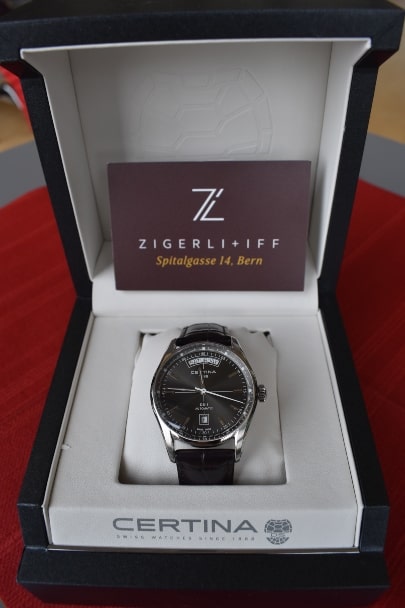
So how did I get a deal with those companies? I offered deals that were both EASY and LOW COST to those companies.
The Perfect Deal
When talking about sponsoring, most people just think about money. Especially in the beginning, you need to be a bit more creative to get some sponsors.
Remember that 80% of my costs were Playing Hall + Prizes. Getting 1500$ of free (useful) prizes is the same as getting 1500$ in cash. However, for the sponsor, it is MUCH easier & cheaper to give you prizes rather than actual money.
I asked the Computer Company for a Computer to give away to one lucky participant. As they usually have some leftovers with not super-new components, the cost to them is basically 0$. They agreed immediately. Additionally, they asked me if they could also sponsor me directly.
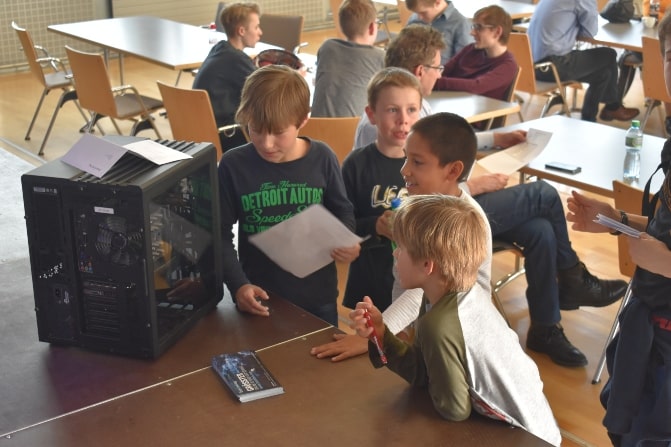
Here again, instead of opting for cash, I asked for a super-powerful computer for myself. As a professional player, you need a strong processor & graphic card to make great analysis. So for me, getting 5’000$ cash or a 5’000$ PC is basically the same. For them on the other hand, it makes a big difference.
If you only learn one thing about finding sponsors, then let it be this: Always think from your potential sponsor’s point of view.
How can you make the deal as easy and cheap as possible for them, while keeping it similarly useful for you?
We got a great watch as 1st prize in the main tournament (worth 800$). Again, much cheaper for a jewelry store than 800$ cash. In addition, the online chess store gave 500$ vouchers. Obviously, this only works if the prizes are also useful to your participants.
You shouldn’t get a bunch of barbies if your main target audience is male chess players aged 20-60. The most overlooked quality in finding sponsors is EMPATHY. Both for your participants and potential sponsors.
Some Additional Thoughts On Sponsoring
If you want to improve your negotiation skills, I can wholeheartedly recommend “Never split the difference” by former FBI Hostage Negotiator Chris Voss. I wish I read that one before organizing the tournament. I’m sure I would have landed even more & better deals.
As for the second edition, 2/4 of the sponsors from the previous year had signed a deal already. Thanks to the proof of concept, I managed to find three additional, more potent sponsors.
One sponsor that said no for the first edition was convinced by the result & great turnout. Do not take a no personal & don’t cut ties to companies even if they say no.
A No just means: not in this exact way, not in this exact moment. Again, push your ego aside, say thanks for considering it and ask if you can try it again next year. In my case, it worked and the deal was way better than what I asked for 1 year before…
Secure A Playing Hall
Once you know you won’t go bankrupt, you can sign a deal for the tournament hall. I do believe this is a point where most organizers don’t spend enough emphasis on.
Why are you playing a chess tournament? To have a great experience!
A big part of the experience is the playing hall. Sadly, there are way too many crammed tournament halls with shabby plastic boards. All the money goes into the prize fund so that some GM can come and get a nice payday. While this is nice for 1 person, 80% of the playing field literally does NOT care about the prizes for the top finishers.
If you want a lot of happy participants, invest in their experience. By the way, the playing hall is also a great sponsorship possibility. Getting a nice hall for free can make a big difference in your budget.
Look out for conference centers & hotels with a restaurant. If you bring enough people that stay for lunch and buy some drinks/snacks during the tournament, you might get the hall for free (or with a big reduction in price).
This actually also makes things easier for yourself. You don’t need to have a snack bar or even organize some lunch for participants. It is again a win-win scenario for all 3 parties involved (organizer, participant & sponsor).
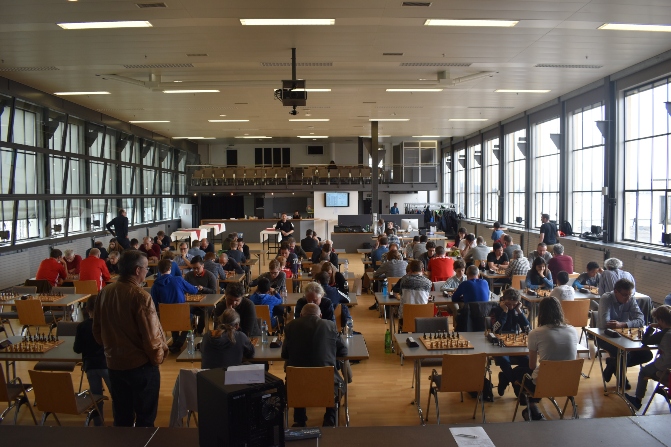
Advertise
Once you are all set, you need to get the word out to chess fans! The more happy participants, the better it is. Make sure to set a limit though to ensure the QUALITY of your tournament.
I could have crammed up to 200 players into my playing hall. But we decided to set a limit at 100 (nearly reached it). This would mean everyone had a lot of space & nice wooden boards.
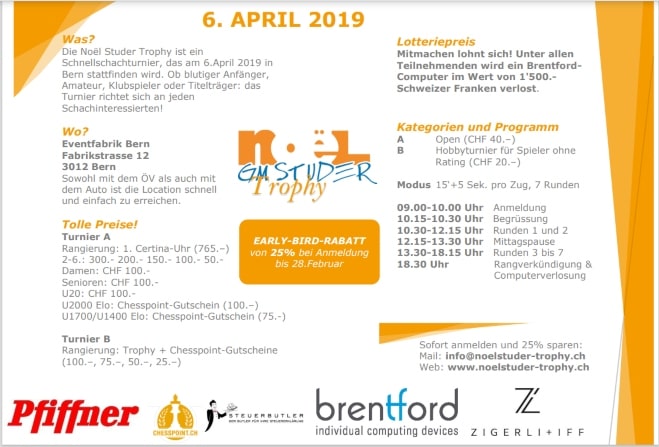
Controversial Name
One way to do that for me was by naming the tournament after myself: “Noël Studer Trophy”. I was very aware that this might seem utterly egoistic or self-loving. I was willing to take that risk because the tournament was way easier to promote this way. “Bern Rapid Open” would just be another tournament. But there is only one tournament organized by a Grandmaster in Switzerland.
Both sponsoring & advertising proved to be much easier this way. I was very happy to change the name (if needed) once the tournament was established. There were lots of negative comments in the Swiss chess scene about this name.
Honestly, some people will always find something negative to talk about. You will never make it right for everyone.
As I knew I didn’t do it because of idleness or ego, I literally did not care about their comments. The 80 participants did not care either, it seems… 😉
Where Do You Advertise?
Online advertisement can be tricky, as many online chess fans aren’t willing to play a tournament just yet. If you advertise online, try to be as precise as possible. I did a banner on the homepage of the Swiss chess federation, which worked fine. Anyone who visits that site is a potential participant.
On the other side, doing a Facebook advertisement is utterly impractical for an OTB event. Most recipients of your ad will either not play OTB Chess or be too far away.
Spend your ad dollars wisely!
Your best shot is to advertise at similar tournaments or in chess clubs in your region. Reach out to tournaments and ask for a partnership. You advertise at their tournament & they advertise at your tournament.
Again, this is a win-win partnership and you don’t have to pay anything for it! Make a flyer and send it to different chess clubs/schools in your area. Ask friends to talk to other chess fans about the tournament.
If there is a local chess magazine, then this can also be a great way to reach some potential players.
In short: advertise where your target audience is most likely hanging out.
Conclusion
This is a great moment to thank again everyone involved with this tournament. So many people played a big role and without them, the tournament would have never been the same.
Thank you!
Organizing a tournament was a very interesting experience for me. I learned a LOT. For example, one nice side effect was that I appreciated all tournaments I played in way more. I understood how much work is really done behind the scenes so that all the participants can enjoy a good event.
It is also a really great feeling to organize something that is worth a full day for 80 people. In a time when we all have hundreds of possibilities, this was pretty meaningful for me. Giving something back to the chess scene that has given me so much over the past 2 decades really felt great.
I would strongly encourage you to try it out yourself (in any size!) if:
- You are willing to put the time in
- Earning money with it is no priority (I made around 1$/hour 😂)
- You can imagine doing it for more than 1 year (it just gets so much easier afterward!)
Now I would love to hear from you: which is your favorite chess tournament to play and why?
Let me know in the comment section below.
Future Plans
Organizing another tournament is certainly on my to-do list. Yet, I don’t think it will happen in the near future. After a 3 year hiatus, it would be like starting from 0 again. And while that is fine, it would just take too much time at this point. I’m eager to put all my work time into this blog. For the moment, that is the priority.
I might change my mind if I would find someone I can fully trust to take over most of the organization. Then, I would be happy to provide connections, my name & reputation to get the tournament going again. As always, I’m very happy to help you with any questions that come up after reading this article. Just email me and I will get back to you!
So now it is up to you: are you willing to take the challenge and organize a chess tournament? Don’t be afraid to start small, already an 8-player tournament in your club is meaningful.